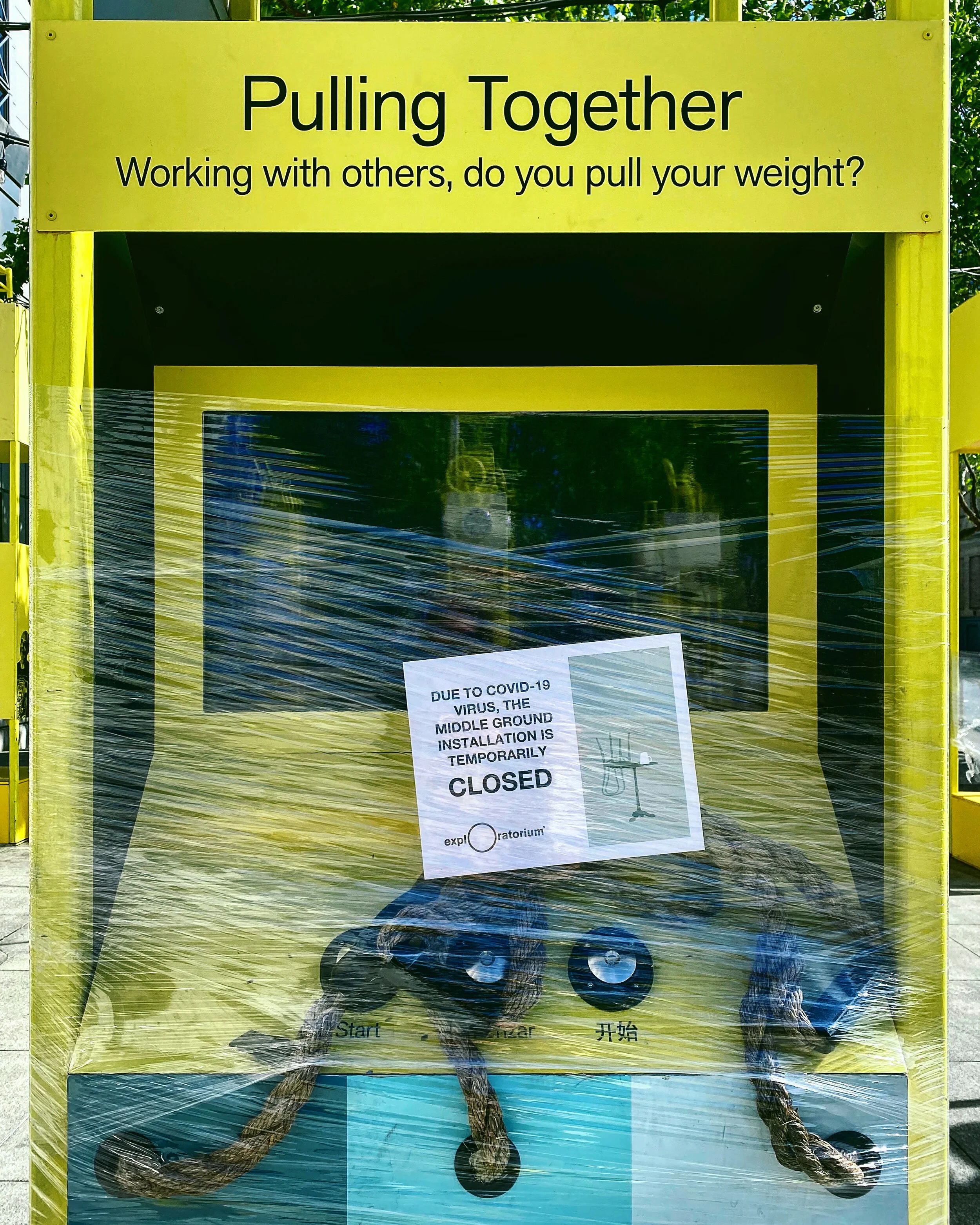On a late night in mid-September, I was walking home from a show. Well, not home, but to someone who felt like it.
That night I noticed an installation set up outside behind the library with interactive exhibits that encouraged those passing by to engage with the strangers around them, meant to illustrate the place we have in the lives of others. I smiled, thinking of my own connections and the joy they brought me.
At the time, it felt like a fun way to state a fairly obvious fact: social interaction was healthy and good for us. People need people.
But what’s a fact to a world gone mad?
Recently I’ve realized that everything is a promise, and that’s not particularly comforting. Because promises aren’t laws of nature; they’re ongoing contracts which must be upheld by all parties. They can be broken. Some far more easily than others, of course. It takes a pandemic to make a country shut down but just a moment of fear to make a person do the same. And when they’re broken, we break.
There are promises everywhere we look. Big and small. Personal and fundamental. They’re trails on the map of charted territory, the fabric of the security blanket in which we wrap ourselves.
Even facts are just promises reinforced by fundamental elements that we assume will remain facts themselves. Science says that human connection is healthy, and there are a thousand reasons why. Until one changes and suddenly it’s anything but.
We make promises to each other, and the world makes promises to us. Shaking hands is a standard greeting. A hug is a comfort, not a leap of faith. Weekdays are for work, weekends are for friends. Go outside and breathe in the fresh air. I’d never do that to you. Death and taxes.
But one handshake should have never happened and hugs turned treacherous and people became grenades and the person who said they’d never do that ended up doing exactly that. Taxes are delayed but don’t worry, death is picking up the slack.
Even the paradoxical promise that nothing was permanent has been broken. Shelter-in-place didn’t stop at the front door. We awoke on to a world on pause. Whatever your situation was on March 16th is what it’s going to be for the foreseeable future, like it or not. Your city, your home, your friends, your relationships. A snapshot of time, and we have no choice but to look. Are you sheltered or are you trapped?
So the promises were broken, and there weren’t enough gloves in the world to pick up the pieces. Everything disappeared suddenly, completely; everything stood still. Shattered glass and cold, unmoving stone. Unbearably loud and impossibly silent.
I spend my weekends walking around San Francisco. Everything’s accessible on foot if you’ve got nowhere to be. I take comfort in the now-familiar streets, thinking that at least one promise has been kept. And then I remember the city is built on a fault line so I stop thinking and keep walking.
There are messages of love on barred windows and plywood doors. Bright blue latex interrupting the natural pinks and greens of a flower bed. Marquees are either abandoned with an ad for a show from mid-March or have an optimistic “be back soon!” on them in a font as bold as that promise.
I stare briefly at each person that I pass, trying to send a message of kindness through my mask and across those 6 feet—the only thing I’d dare transmit. I never fully realized the role the mouth played: a white flag or a smoking gun. I also search for familiar faces. I didn’t break any rules if I just happened to run into them, right? But even a city small enough to walk is too big for that.
When there’s no one around, I lower my mask and my guard. The air is cold, crisp, sweet. Forbidden fruit.
I walk by the exhibit again. It’s the middle of the day but the streets are just as empty as the first time I saw it.
The concept of encouraging people to reach out and touch each other now seems like a relic from an era gone by, with instructions that read like a list of forbidden activities. Grab some people and form a human chain. Push this button. Pull up a chair and have a chat. Hold hands and dance. You, me, we.
And the science: We’re happier, even healthier, when we have regular, positive social interactions. It’s good for you, and for us.
Facts that had been essential truths to us for centuries were now obsolete in the span of a few months, rendering the interdependent world we’ve built useless. A promise held up by a thousand other promises, all threads of the tapestry.
How strange that human connection, the thing that’s supposed to bring us together, so quickly and easily ended up pushing us apart. People need people; people wreck people.
And that home I was heading to that September night? Haven’t been there since. It disappeared suddenly, completely; it stood still. Shattered glass and cold, unmoving stone. Unbearably loud and impossibly silent. And like the other promises, I wondered if it was ever really there at all.

